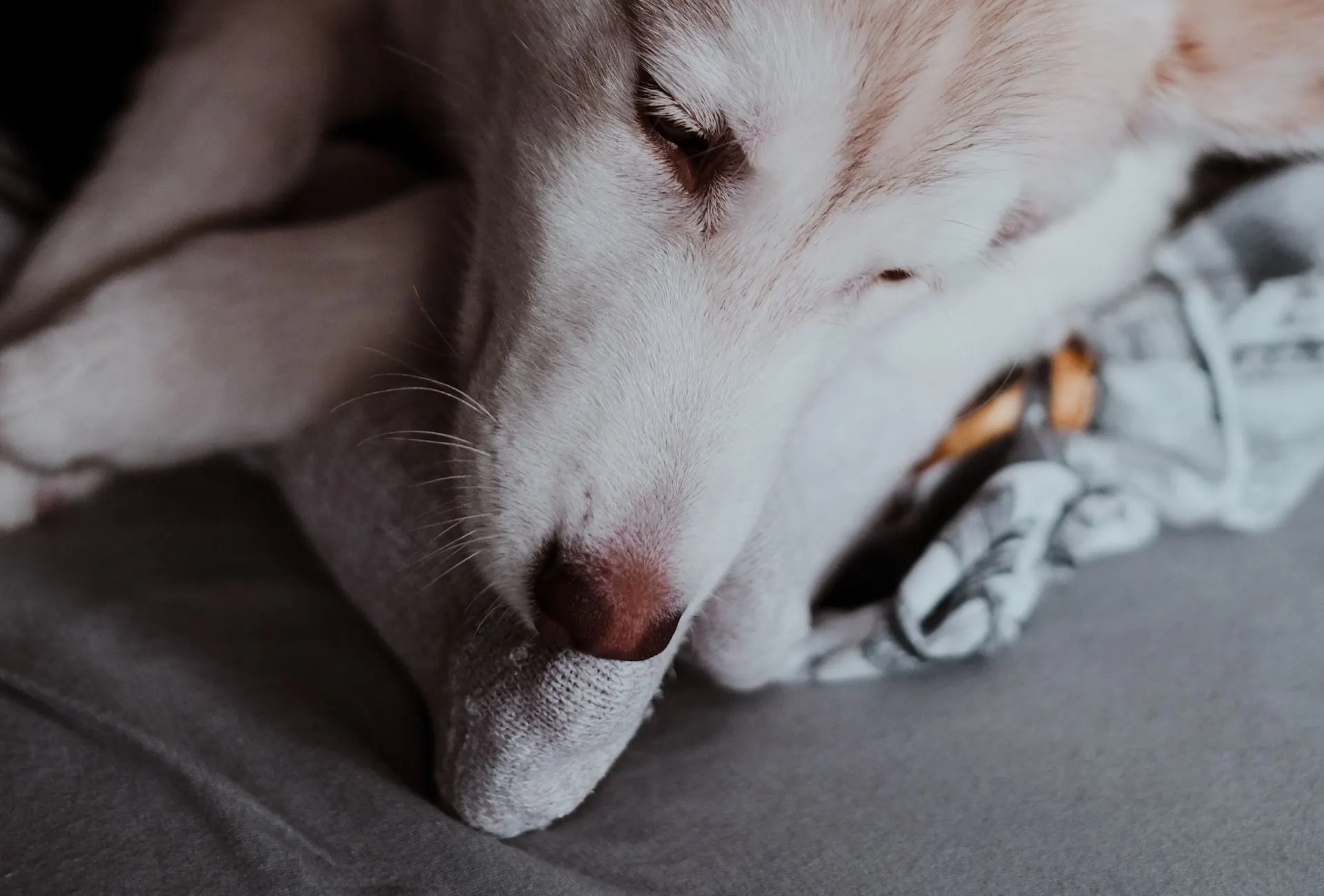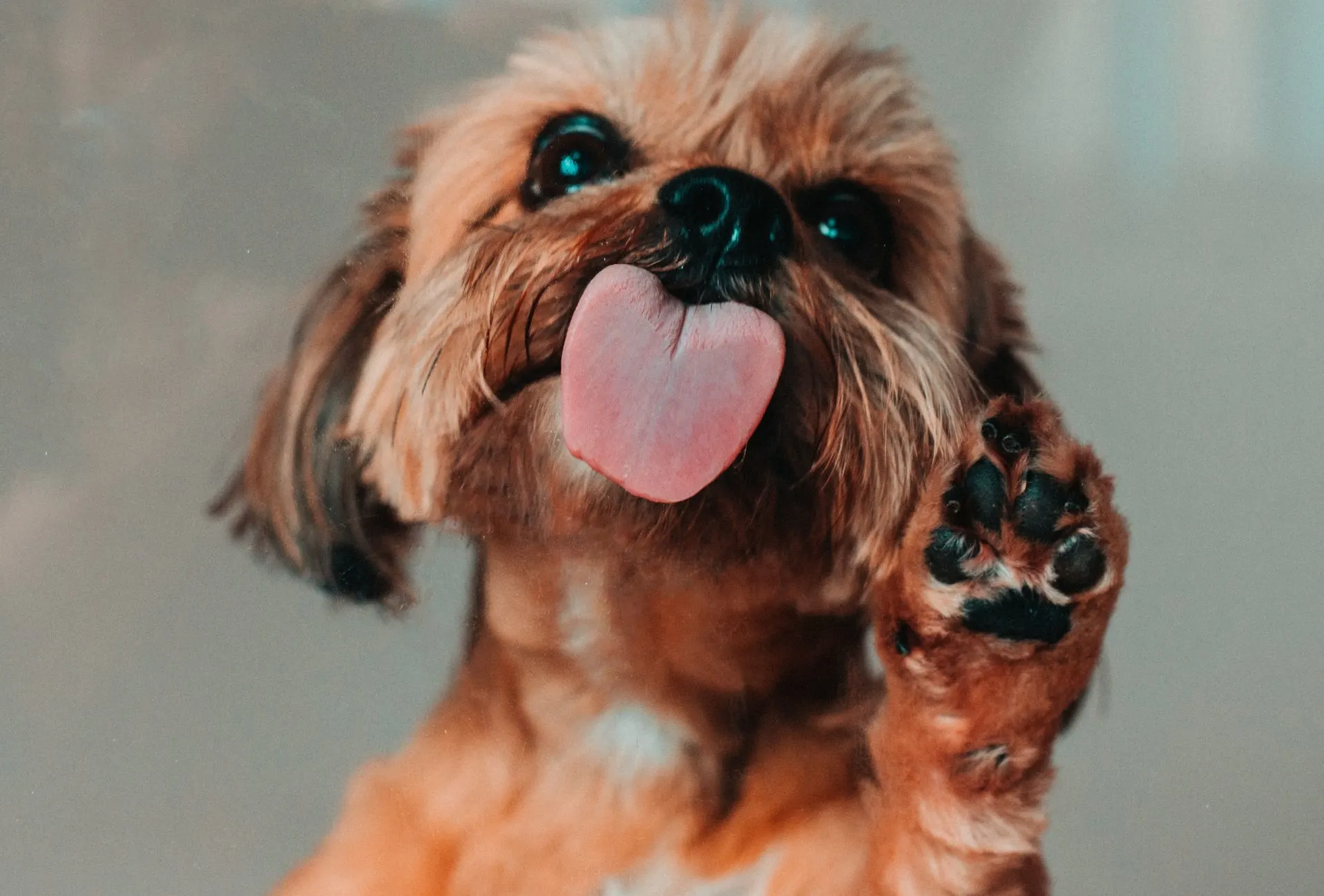A dog’s tongue is used for everything and it’s an important tool to experience their environment and to gain information.
While dogs mostly lick or groom themselves and other dogs, you can also become the target of this slobbery affection.
Most owners get the hands and face kisses but when it comes to our feet many shy away, are too ticklish, or find it simply weird.
Especially when your dog starts to become obsessed with your feet you may find yourself asking: is it bad for my dog to lick my feet?
Let’s find out!
Why Is My Dog Obsessed With My Feet?
Your dog may be obsessed with your feet for a variety of reasons including your unique scent, to get your attention, to show affection, to groom you, or to release some stress.
Licking is a way for your dog to communicate with you and it’s also a self-soothing behavior.
Most dogs lick their owners in some form which can be targeted at any body part.
Some dogs even escalate to the point where love bites enter the chat.

Especially small dogs have a hard time interacting with you since they are so low on the ground and there is only one thing that’s conveniently situated at eye level – your feet.
Whether your dog is obsessed with your feet, your face, or your hands, the underlying reasons are mostly the same.
You may even find the cause of one of your dog’s other quirks.
Grooming
Licking in dogs is first and foremost an instinctual behavior that developed in their early puppyhood.
They first come into contact with licking through their mother who cares for and nurtures them.
In dogs, maternal care is measured using the most commonly observed behaviours, such as the time spent in contact, licking/grooming and nursing of the puppies.
Since newborn puppies have a very limited capacity for movement, maternal interaction is essential to their survival, nourishment and protection.
It is also an important element of the bonding process between puppies and the dam and is thought to play a role in the social development of the puppies.
A review of maternal behaviour in dogs and potential areas for further research, 2019
When you adopt a dog, you become his family, and as such you become part of the grooming circle.
How willingly and how often your dog will try to groom you depends largely on his personality and your reaction when he does it.
This grooming behavior may become more prominent when you are feeling unwell physically and/or emotionally (yep, dogs can sense sadness)
Affection
Licking your feet is a way for your dog to tell you how much he loves you and to bond with you.
It’s a common occurrence that a dog may shower his owner with kisses the second he comes home.
Since your dog is not equipped with hands and cannot talk, he can only show his excitement through body language and affectionate behaviors.
Attention
Nothing gets your attention better than a slobbery kiss planted right across your toes.
Each dog utilizes different strategies to get your attention, such as barking, resting a paw on you, nudging, or jumping up.
The strategy of choice usually depends on your reaction and if you reacted to licking in the past, your dog may continue to use it.
Smell and Taste
Now all the reasons I have already mentioned aren’t really unique to feet licking so why is your dog obsessed with your feet specifically?
There is a very simple answer for that – they smell interesting.
You might not share the same opinion but to your dog, your feet are a hub of biological information.
A dog’s sense of smell is far more advanced and complex than that of a human, enabling them to sense particles far beyond our reach.
The specific anatomical and physiological features of dog olfaction allow humans to achieve outstanding results in the detection of drugs, explosives, and different illnesses, such as cancer, diabetes, or infectious disease.
Canine Olfaction: Physiology, Behavior, and Possibilities for Practical Applications, 2021
The salt from sweaty feet can also taste appealing to dogs especially if they suffer from a mineral deficiency.
Stress Release
Licking is an amazing stress buster and releases endorphins in the dog’s brain.
Endorphins are chemicals that are released during stress and pain to increase well-being.
You can call them the body’s natural pain killer.
Self-soothing through licking is normal behavior in dogs and not something that should be discouraged.
However, if this licking becomes obsessive it could mean that your dog is in a constant state of discomfort or anxiety.
This can happen during stressful periods such as the death of a family member or moving houses but it can also be related to illnesses.
Reinforced Behavior
In general, dogs do whatever has worked for them in the past.
If your dog licks your feet because he wants something and you have fulfilled that wish in the past, there is no reason for your dog to stop it.
Feet licking most definitely will get your attention, even if it’s only to tell your dog to stop.
Negative attention is also attention!
If you are ticklish, you may even start giggling or laughing which gives your dog the message that this is something you like.
When you are trying to wriggle your toes away, your dog might take this as a fun game and start chasing after your feet.
These types of kisses can also be really cute and you may be inclined to reward your dog with a quick cuddle or pet.

Is It Bad for Your Dog to Lick Your Feet?
In general, it’s not bad for your dog to lick your feet as long as they are healthy since it’s normal behavior. However, there are some risks involved when it comes to canine saliva.
You have probably observed your pooch licking his butthole a thousand times in the past and you really can’t blame them.
How else are they supposed to keep themselves “clean”?
What also happens in this process is that your dog collects fecal matter on his tongue which is later spread across the coat.
Researchers from the UK Royal Veterinary College and the University of Lisbon collected 85 stool samples from Portuguese and British households and found that 14% of dog samples contained a super strain of E.coli.
However, the human stool samples didn’t do much better with 13% containing superbugs so it’s good that we don’t go around licking each other and our buttholes.
Even before COVID, antibiotic resistance was one of the biggest threats to public health. It can make conditions like pneumonia, sepsis, urinary tract and wound infections untreatable.
Lead study author Dr. Juliana Menezes
Dog saliva can also transmit Capnocytophaga bacteria and parasites.
That’s not to say that you will certainly get anything harmful from your dog’s licking behavior.
These are just things that could happen and it’s best to be more on the cautious side and wash your hands (or feet for that matter) after your dog has licked them.
What you should certainly not allow is licking any wounds, cuts, or scratches for your own and your dog’s sake.
Also if your feet are unhealthy for whatever reason or if you have applied something to them (creams, topical treatments, etc.) keep them out of your dog’s reach.
How Do I Get My Dog to Stop Licking My Feet?
You can stop your dog from licking your feet by distracting him, encouraging him to do something else, and being consistent with it.
What you should never do is punish your dog for something as natural as licking.
Instead, you can provide your dog with something else to lick or chew on like a peanut butter stuffed Kong.
You can also show your dog what he should do instead of licking.
If your dog is licking your feet for attention, show him that he will only receive that attention when he sits calmly.
Whatever you choose as your method, be consistent with it.
Oftentimes, wearing a thick pair of socks is discouraging enough so that your dog won’t attempt getting to those salty feet.
If your dog is too persistent and obsessive with his licking, there may be something wrong either physically or behaviorally.
Disclaimer: This blog post does not substitute veterinary attention and does not intend to do so. I am not a veterinarian or pet nutritionist. If your dog shows any sign of illness, call your vet.